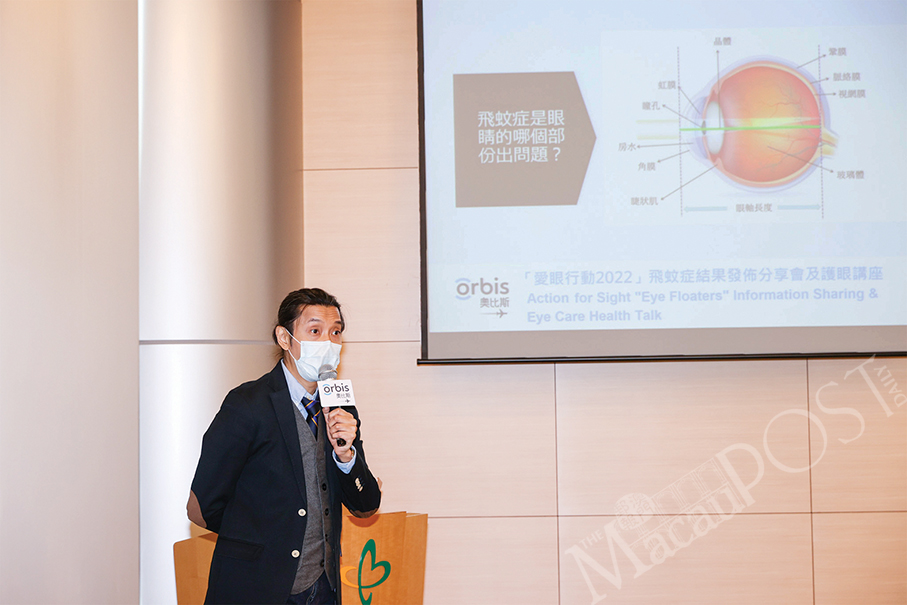An online survey by Orbis found that from 1,059 valid responses collected, over 85 of respondents are not in the habit of going for regular eye tests, while more than 30 percent believe that there isn’t a need to seek medical advice when eye floaters show up, the non-profit organisation said in a statement on Friday.
The responses were collected between October 13 and November 15. Details were also provided during the Orbis Action for Sight “Eye Floaters” Information Sharing and Eye Care Health Talk, which was co-organised by, and held at Kiang Wu Hospital on Friday
According to the statement, the survey showed that people tend to ignore the appearance of “sudden symptoms” including eye floaters, which could be a potential symptom of more serious eye conditions, and don’t seek medical assistance, showing that they are unaware of the symptoms’ potential danger, or if it could be related to more serious eye conditions and/or diseases.
Moreover, Kiang Wu Hospital ophthalmologist Dr Fong Sao Nok said during the talk that around 83 percent of the survey’s respondents said that they have eye floaters. Although 69 percent of them misunderstood eye floaters as being an eye disease, most indicated that they would seek medical advice when floaters suddenly appear, particularly for situations such as many floaters materialising at once along with flashes, he said.
Fong added that eye floaters are normal occurrences that are caused by “the degeneration of the vitreous* in the eye” during shrinking and liquifying actions, and their impurities are projected on the retina when light comes into the eye, forming a dark shadow known as “floaters”.
Less than 15 percent of the respondents have regular eye examinations, with Orbis Macau Director of Development Isabel da Silva reminding the public to pay more attention to the health and long-term wellbeing of their eyes and visit an ophthalmologist annually for a regular examination.
Meanwhile, over 85 percent of the respondents with high myopia have floaters, which have a “close relationship”. Fong added that those with high myopia should pay attention to their eyes’ changing conditions and new symptoms, which could indicate an underlying eye disease.
Furthermore, Fong noted the importance for the community to understand symptoms including eye floaters, which would not directly lead to “a vision crisis” in most cases, but could be “a harbinger of more serious eye conditions” in some cases.
Moreover, Isabel da Silva added that over 60 percent of respondents have a habit of rubbing their eyes, with those doing so likely to cause “conjunctival inflammation and corneal damage”, adding that those with itchy and/or red eyes should seek medical advice to find out the cause, which could range from a simple allergy to a chronic disease including diabetes.
The statement also underlined the importance of paying extra attention to the younger generation’s vision development, particularly myopia, given the digital transformation and time spent in front of screens, as well as to develop a better balance in their digital lives.
More details can be found at www.orbis.org/mo-afs or calling 2830 0787. Moreover, the Action for sight 2022 Virtual Exhibition can also be visited at https://cloud.chan3d.com/scenes/2EywP0ncwlMNPgGtyl9jYFWbJz8/index.html.
*According to Wikipedia, the vitreous body is the clear gel that fills the space between the lens and the retina of the eyeball in humans and other vertebrates.

This handout photo taken and provided by Orbis Macau on Friday shows Kiang Wu Hospital ophthalmologist Dr Fong Sao Nok giving a presentation during the Orbis Action for Sight “Eye Floaters” Information Sharing and Eye Care Health Talk.









